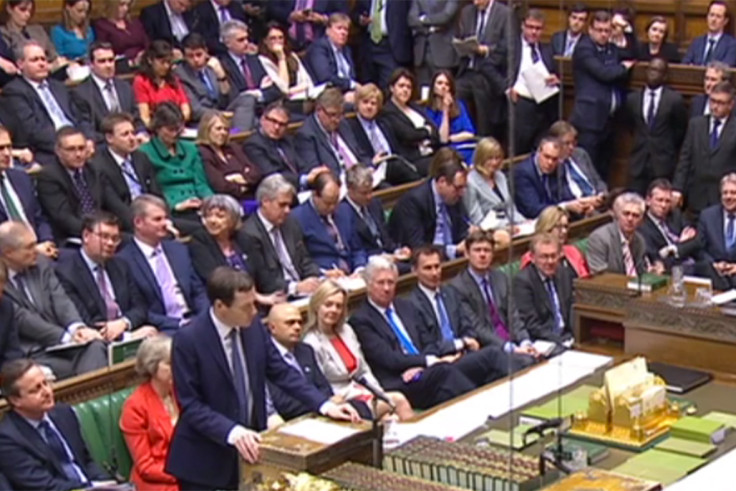Budget 2016: Our economy isn't on the mend - it's functioning without a moral compass
Osborne has failed to reign in national debt but has caused profound heartache to our most vulnerable citizens.

I grew up rough and ready in the maelstrom of the Great Depression, where life was as cheap as chips. That's because governments were run by the 1% who believed that austerity for ordinary workers was the best economic remedy for debt, low growth and flat wages.
It didn't save the economy back then, but it did create a profound suffering that left many families hungry and homeless. My family was one of millions of working families in Britain during the 1930s that was thrown onto the rubbish tip of history by austerity. After my father lost his job in the mines we lost our dignity, were evicted from our residence, and left to starve by an indifferent government and docile press.
Having seen homelessness increase as well as food banks in all parts of Britain under the tenure of Cameron's government during the 21st century, I know that this economy isn't on the mend but is instead functioning without a moral compass.
As George Osborne takes our present day social safety net away brick by brick, I fear that my grandchildren's generation will become horribly acquainted with the hardscrabble world of my youth.
I am part of the last generation to know what life was like before the Welfare State, but as George Osborne takes our present day social safety net away brick by brick, I fear that my grandchildren's generation will become horribly acquainted with the hardscrabble world of my youth.
This is why as I watched George Osborne's budget today my mind became overwhelmed with unease. In-between his lofty straplines about ending inequality and making housing affordable for all, there was a sickening feeling in my stomach that this chancellor will put the next generation in as precarious state as mine was during the turmoil and misery of the Thirties.
Since George Osborne became chancellor six years ago, he has played one motif – that debt damages the chances of the next generation's financial future – with the same tenacity as a bad pianist plays chopsticks to an underwhelmed audience.
Yet, over his last eight budgets Osborne has failed to reign in our national debt and has instead succeeded in causing profound heartache to our most vulnerable citizens through malicious cuts to local councils and those who receive benefits.
In fact, in past budgets Osborne's obsession with remaking society in the image of his brethren (the 1%) – through the bedroom tax or cuts to income tax credits – has helped accelerate a pernicious economic gap between our more affluent citizens and struggling families who make up the majority of Britain.
Nothing better illustrates to me that Osborne is sailing us back to the harsh and socially unsustainable cruelty of the 1930s than his removal of substantial benefits from over 200k disabled citizens to pay for middle class tax relief. We cannot grow or sustain our middle class by starving our poorest members of society.
Nothing better illustrates to me that Osborne is sailing us back to the harsh and socially unsustainable cruelty of the 1930s than his removal of substantial benefits from over 200k disabled citizens to pay for middle class tax relief
When he strips our most vulnerable of living a dignified existence through cuts to their benefits it doesn't make our economy stronger, it makes Britain a weaker nation because we have repudiated our greatest national asset: our belief in fair play.

No matter how much Osborne crows about saving the next generation from the vicissitudes of financial uncertainty, it won't happen through tax cuts or increasing the amount one can stash in an ISA, because the real threat to Britain's next generation is low wages and an economy that has become skewered to reward only our most affluent citizens.
Britain must be very concerned by this budget because these policies of social service restraint whilst lowering corporation tax to 17% will produce one outcome for this country: the end of the Welfare State.
Simply put, our chancellor doesn't have the capacity to fund both society and the excesses of those who live large on the the tax avoided profits of hedge funds.
The real threat to Britain's next generation is low wages and an economy that has become skewered to reward only our most affluent citizens.
Britain can't save its next generation if it doesn't invest in infrastructure all across this country.
Britain can't save its next generation unless it builds affordable homes on a a scale not seen since the days of Attlee and Harold Macmillian in the 1960s.
Britain can't save it's next generation if it doesn't introduce a real living wage instead of topping up the minimum wage.
And Britain most certainly can't save the next generation unless it reduces the cost of education and produces a viable action plan to put our young in gainful employment rather than stocking shelves on zero-hour contracts.
Sadly my fear is that George Osborne has condemned the next generation to the horrors my generation thought we had put to an end. We supported a Britain that believed in fair taxation, fair wages, fair benefits and the rights to all citizens – whether they be rich, poor or in-between – to a life that had both comfort and purpose.
Harry Leslie Smith is a 93-year-old Second World War veteran, activist and writer. His first book, Harry's Last Stand, was published in June 2014 and his second, Love Among the Ruins, is out now. Check outwww.harryslaststand.com and follow him on Twitter at @Harryslaststand
© Copyright IBTimes 2025. All rights reserved.






















